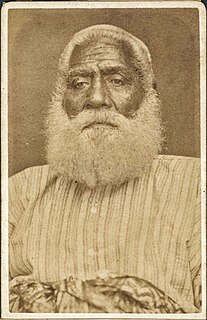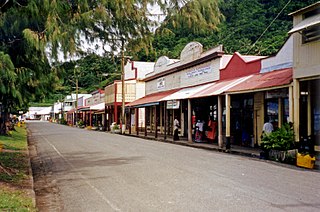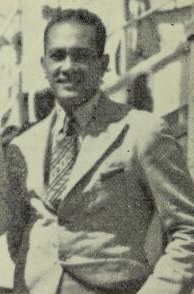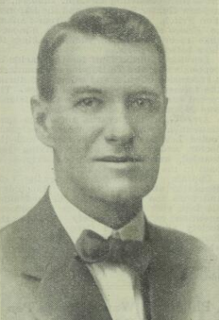
Ratu Seru Epenisa Cakobau was a Fijian Ratu and warlord (Vunivalu) who united part of Fiji's warring tribes under his leadership, establishing a united Fijian kingdom.

Levuka is a town on the eastern coast of the Fijian island of Ovalau, in Lomaiviti Province, in the Eastern Division of Fiji. It was formerly the capital of Fiji. At the census in 2007, the last to date, Levuka town had a population of 1,131, about half of Ovalau's 8,360 inhabitants. It is the economic hub and the largest of 24 settlements on the island. Levuka and the island of Ovalau had been seeking recognition from UNESCO as a World Heritage Site for decades, finally being designated in June 2013.

Ratu Sir Edward Tuivanuavou Tugi Cakobau was a Fijian chief, soldier, politician and cricketer. He was a member of the Fijian legislature from 1944 until his death, also serving as Minister for Commerce, Industry and Labour and Deputy Prime Minister. During the 1940s he made two appearances for the Fiji national cricket team.
Kunwar Bachint Singh was an Indo-Fijian teacher and politician. He arrived in Fiji in 1927 as a teacher for the Arya Samaj but his association with Vishnu Deo led him to play an active role in aggressively promoting the Arya Samaj and finally into politics. He was elected into the Legislative Council as a protégé of Vishnu Deo but after the election took an independent stance opposed to the wishes of the majority of the Indo-Fijians. He supported nominated rather than elected representation, actively supported the war effort and even attempted to set up a farmers union opposed to a number of existing unions. The Government rewarded him for his loyalty by nominating him into the Legislative Council three times, appointing him as a Justice of the Peace and as the first Indo-Fijian member of the Executive Council.

James Madhavan was an Indo-Fijian politician. He was a member of the Legislative Council and House of Representatives for most of the period between 1947 and 1973 and had two spells in the Executive Council.

General elections were held in Fiji between 17 April and 4 May 1963. For the first time, women and indigenous Fijians were given the right to vote alongside the male European and Indo-Fijian population.

Sir John Maynard Hedstrom was a Fijian businessman and politician. He served as a member of the Legislative Council for over 30 years. Alongside Robert Crompton, Henry Marks and Henry Milne Scott, he was one of the 'big four' that heavily influenced the Fijian economy and political sphere in the first half of the 20th century.

General elections were held in Fiji in July 1937, the first in which an equal number of Europeans and Indo-Fijians were elected.
Sir Hugh Hall Ragg was a Fijian businessman and politician. He served as a member of the Legislative Council between 1926 and 1950.

Sir Henry Marks was an Australian-born Fijian politician, serving as a member of the Legislative Council of Fiji for over twenty years. Alongside Robert Crompton, John Maynard Hedstrom and Henry Milne Scott, he was one of the 'big four' that heavily influenced the Fijian economy and political sphere in the first half of the 20th century.

Alfred George Smyth was a New South Wales-born Western Samoan politician.
Brahmanand Raghvanand was an Indo-Fijian civil servant. He served as a member of the Legislative Council in the 1950s.

Captain David Robbie was a Scottish-born businessman, planter and politician in Fiji. He served as a member of the Legislative Council between 1905 and 1908.
John Trotter was an Australian businessman who worked for Burns Philp in Tonga and Fiji for over 30 years. He served as a member of the Legislative Council of Fiji between 1938 and 1944.
Robert Crompton was a British lawyer and politician in Fiji. Alongside Henry Marks, John Maynard Hedstrom and Henry Milne Scott, he was one of the 'big four' that heavily influenced the Fijian economy and political sphere in the first half of the 20th century.
Tualaulelei Mauri was a Western Samoan chief and politician. He served as a member of the Legislative Council and Legislative Assembly between 1943 and 1961, and as Minister of Lands and Minister of Agriculture between 1956 and 1961.
Sadanand Maharaj was an Indo-Fijian politician. He served as a member of the Legislative Council and Executive Council between 1950 and 1953.
Abdul Rahman Sahu Khan was an Indo-Fijian civil servant and politician. He served as a nominated member of the Legislative Council between 1944 and 1947.
Ratu Tiale Wimbledon Thomas Vuiyasawa was a Fijian chief, civil servant and politician. He served as a member of the Legislative Council and Senate.

Jonati Malamala Mavoa was a Fijian civil servant and politician. He served as an MP from 1966 until his death, and held several ministerial positions from 1969 onwards.










